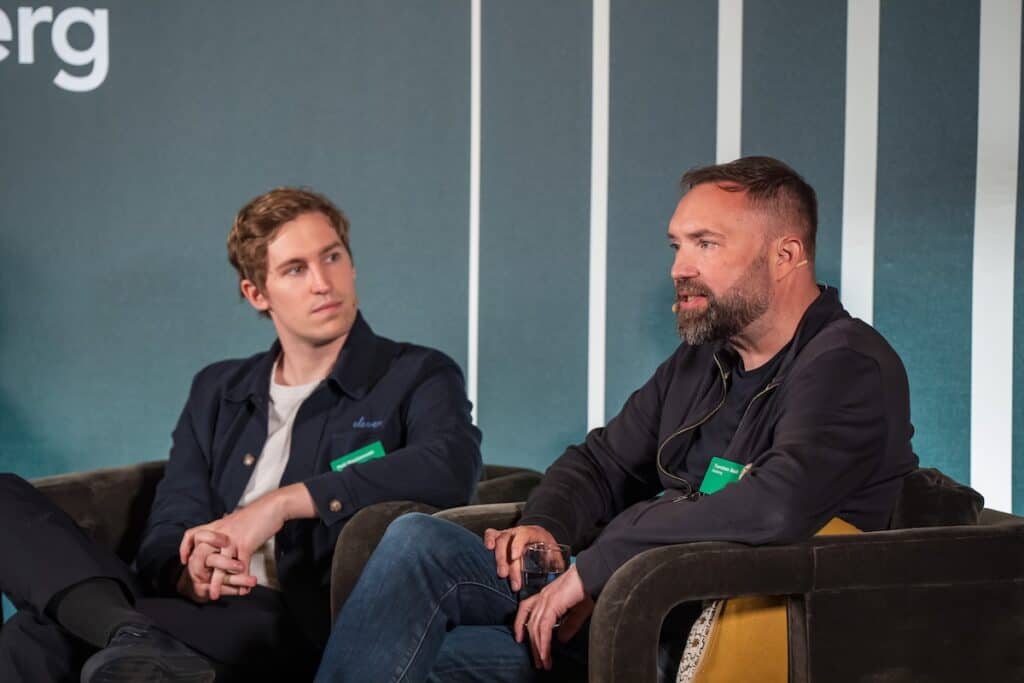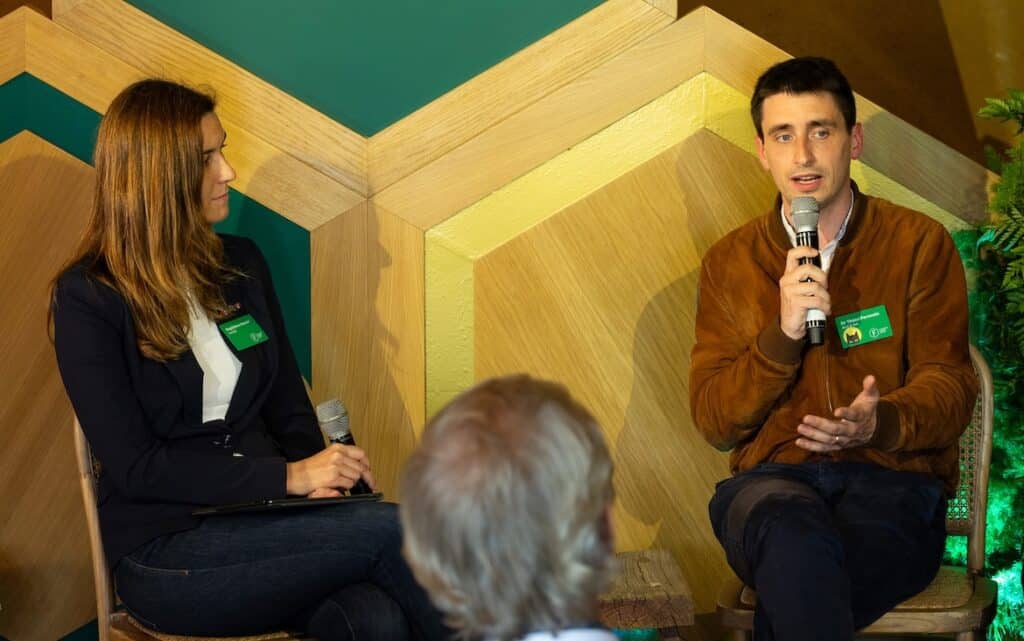Last updated on August 11, 2025
What’s next for enterprise AI? Demis Hassabis (Google Deepmind), Mati Staniszewski (ElevenLabs), May Habib (Writer), and more top AI founders discussed the future of AI-native organisations at FF Global 2025.
When ChatGPT launched in November 2022, few people outside the tech geniuses at Founders Forum knew much about generative AI. Today, nearly 40% of adults in the US are using gen AI tools and more than 10% are using ChatGPT every day at work.
Companies have adopted generative AI tools faster than any other AI technology in history. According to The Tech Nation Report 2025, in the UK alone, 1 in 2 tech companies have changed their ways of working and improved their products and services as a result of AI, and 76% of UK tech leaders say AI is having a positive impact on their company’s growth.
This doesn’t take away from the challenges of adopting AI as a business, as leading tech founders at FF Global highlighted slow implementation rates and mistrust surrounding AI innovation.
But will AI agents run the businesses of the future? Read on to uncover the key insights from Inside FF.
Founder Spotlights
May Habib, Writer

HQ: San Francisco, California
Stage: Series C
Total Funding: $369m
FFs Attended: 5
Writer AI’s May Habib sat with Eleven Labs’ Mati Staniszewski, DeepL’s Jarek Kutylowski, and SambaNova Systems’ Rodrigo Liang to discuss how voice, language, and agent-powered interfaces are driving AI innovation and what it really takes to scale them in today’s enterprise environment.
Demis Hassabis, Google Deepmind

HQ: London, UK
Stage: Acquired by Google in 2014 for $650m
FFs Attended: 6
Google Deepmind’s Demis Hassabis sat with ARIA’s Ilan Gur to discuss how to launch moonshots, and how we can push technology to its outer edge.
Mati Staniszewski, Eleven Labs

HQ: New York, US
Stage: Series C
Total Funding: $281m
FFs Attended: 7
Eleven Labs’ Mati Staniszewski spoke to Writer AI’s May Habib, DeepL’s Jarek Kutylowski, and SambaNova Systems’ Rodrigo Liang about AI-powered innovation in business at FF Global 2025.
AI’s Enterprise Takeover
With rapid developments in AI, we’re seeing efficiency gains and widespread transformation of businesses. Both OpenAI’s Chat GPT and Microsoft’s Copilot have seen a dramatic enterprise uptake, both surpassing over 3 million paying business users. 71% of users report feeling more satisfied at work, with 75% of ChatGPT Enterprise users noting improved creativity and innovation after AI adoption.
Industry leaders are already predicting that entire business functions will be under full AI ownership within five years.
One major financial services firm is introducing AI-first products that enable operations with 90% fewer staff compared to traditional teams in a global banking business.
Professional services firms, traditionally built on hourly billing models, are also shifting rapidly toward outcome-based pricing, a model which works especially well when the service is delivered by an AI agent working 24/7.

Introducing AI Agents!
Increasingly, we’re seeing agentic AI systems that don’t just respond to queries but autonomously execute complex, multi-step processes. Google’s SOC Manager agent can independently detect malware, coordinate an incident response plan, block malicious files, and generate documentation, all without human intervention
And early evidence suggests that agent-to-agent collaboration is actually outperforming human-agent interaction in many scenarios. A study using LLMs in collaboration shows that agents working together achieve higher reward and more consistent performance than when humans are involved.
These systems are learning to coordinate with each other in ways that bypass traditional human oversight, creating workflows that are both more efficient and more consistent.
We’re seeing the emergence of the ‘first agent’ paradigm — the idea that for many companies, their first AI hire won’t be a tool to help humans work better, but a complete replacement for entire categories of human work.
Barriers to AI Implementation
Despite the transformative potential of AI and AI agents in the workplace, full enterprise adoption remains relatively constrained.
The computational demands of agentic AI are huge and seen in the uptick of token consumption. This refers to the way an AI system uses up its allocated processing units, such as bits of word or text that an AI processes when it generates or interprets language. Moving from chat to reasoning systems increases token consumption by 10 times, while the leap from reasoning to full agentic systems multiplies it by 100.
Many companies simply do not have the resources, financial or technological, to implement such high functionality. Many AI tools are priced by token, so cost per employee may become impossible, and the higher the token consumption, the more complex the infrastructure required to run the systems.
Traditional businesses with outdated digital systems don’t have much success with AI implementation beyond the initial, experimental phases. Legacy infrastructure can’t integrate modern AI tools without costly and time-intensive system overhauls.
The persistent challenge of AI hallucinations and unpredictable outputs has also created a trust issue for many risk-averse businesses. The uncertainty of AI capabilities in a workplace may also lead to planning and forecasting complications, so there’s a tension between implementation and the structural reality of established enterprise operations.
Subsequently, the share of tech businesses scrapping most of their AI initiatives increased to 42% this year across North America and Europe, up from 17% last year.

How Will AI Agents Affect Future Businesses?
Those organisations that are successfully implementing AI are using rapid experimentation cycles and strategic human-AI collaboration models.
Rather than pursuing full automation, these businesses are implementing hybrid models that combine AI automation with human oversight, particularly in regulated industries where compliance requirements demand human accountability.
Leading enterprises have embraced a three-month maximum proof-of-concept timeline for AI agent deployment, as extended pilot phases often lead to poor organisation and missed competitive opportunities.
Looking forward, the trajectory of AI so far suggests a fundamental restructuring of business operations, which is already underway. Companies are increasingly looking to hire skilled technical workers with AI capabilities over more traditional credentials. Researchers are negotiating NBA-style salary packages. In a bid for 24-year-old AI founder Matt Deitke to join Meta’s superintelligence, Mark Zuckerberg offered him $250m over four years, which he struggled to refuse.
AI performance is doubling every seven months. Whilst infrastructure limitations are capping the extent of automation for some businesses, in others, AI is becoming integral. Ultimately, AI-native companies, which integrate AI into their processes, products, and culture as a first principle rather than layering AI onto existing systems, will thrive.
AI agents will become embedded operational layers inside companies, but organisational structure itself will be the distinguisher of success in the AI era.
 All Posts
All Posts


